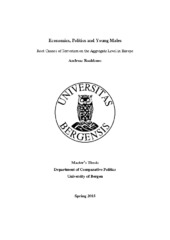Economics, Politics and Young Males. Root Causes of Terrorism on the Aggregate Level in Europe
Master thesis
Permanent lenke
https://hdl.handle.net/1956/11624Utgivelsesdato
2015-06-01Metadata
Vis full innførselSamlinger
Sammendrag
The research question posed in this thesis is: what are the root causes of terrorism on the aggregate level in Europe. There is little convergence on the root causes of terrorism in the field of terrorism research, and many findings are challenged on data and conceptual grounds. The analysis is done with two dependent variables each representing an operationalization of terrorism, a count of the number of killed in terrorism events for each country-year observation and a count of the number of terrorism events for each country-year observation. The dual operationalization gives the thesis a higher conceptual clarity and ability to corroborate, reject and qualify previous findings in the field of terrorism research. The data is collected from the Global Terrorism Database and covers 26 countries in Europe from 1998-2007. The statistical analysis tool utilized, the Negative Binominal Regression, is designed specifically to analyze count data. This thesis finds that demographic explanations, most of all the size of the young male population bracket, are the strongest predictors of terrorism. The thesis also finds support for economic factors, both income inequalities and levels of GDP per capita, but with different effects on the dependent variables. While previous theory suggests that the main background for a more deadly segment of young males are absence of work opportunities, my findings are that youth unemployment does not affect the effect of young males on levels of terrorism.
